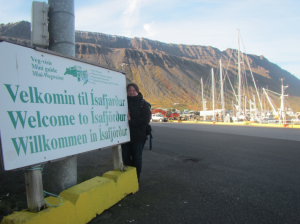Teaching a block course at the University Centre of the Westfjords, Iceland.
For those of you who were surprised that lately they didn’t recognize my students any more and the view from my office window was greatly improved: I am excited to be in Isafjördur in the Westfjords to teach the first two weeks of CMM31 “understanding the ocean” as part of the Master’s in Coastal and Marine Management.

Welcome to Isafjördur!
I visited the University Centre of the Westfjords by chance, really, when two years ago a research cruise ended in Isafjördur and I got in touch to ask whether they wanted to bring their students on a tour of the research ship. From that a connection developed and I taught two lectures on waves and tides at the University Centre of the Westfjords last year – except that I was sitting in my comfy office in Norway then and taught via Skype [more on how that worked in a later post]. While that was certainly an experience, this time I am actually physically present, and I’m very glad about that.
When preparing for the course I got an email from Dagny, the program’s academic director, who wrote “You will find that this is not a typical uni environment, hopefully in a good way.” And she was so right! It is not a typical university environment, but in the best way. I am so excited to be here and definitely hope to come back again next year! :-)
P.S.: The tag CMM31 marks posts that are about things I’ve been teaching while in Isafjördur.

